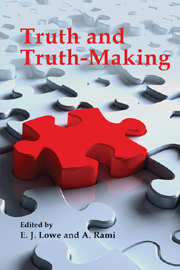Book contents
- Frontmatter
- Contents
- Preface
- Contributors
- 1 Introduction: truth and truth-making
- Part I Setting the stage
- 2 Truth and the truth-maker principle in 1921
- 3 Truth-makers
- 4 Truth-makers, entailment and necessity
- 5 Postscript to “Truth-makers, entailment and necessity”
- 6 Truth-making and difference-making
- 7 The general theory of truth-making
- Part II The current debate
- Bibliography
- Index
2 - Truth and the truth-maker principle in 1921
from Part I - Setting the stage
- Frontmatter
- Contents
- Preface
- Contributors
- 1 Introduction: truth and truth-making
- Part I Setting the stage
- 2 Truth and the truth-maker principle in 1921
- 3 Truth-makers
- 4 Truth-makers, entailment and necessity
- 5 Postscript to “Truth-makers, entailment and necessity”
- 6 Truth-making and difference-making
- 7 The general theory of truth-making
- Part II The current debate
- Bibliography
- Index
Summary
Truth-makers
Friends of truth-making in the first half of the last century make up a small but select band of philosophers: G. F. Stout (1911, 1930); Ludwig Wittgenstein (1979: 15, 95); Bertrand Russell (1918: I; 1940: 227); John McTaggart (1921: bk I, chs 1–2); Alexander Pfänder (1921: 231–43, 75–89); C. D. Broad (1933: 56ff.); and J. L. Austin (1961: 91, 104ff.). The band of truth-makers thus includes many philosophers from Cambridge. If we assume that Wittgenstein's appeal to truth-making in 1913 and 1914 is still at work or on display, if not expressed, in the Tractatus, then we may say that 1921 is the annus mirabilis or at least the first high-point of the theory of truth-making. For it is in the third or fourth most important treatise on logic to appear in 1921 (the year in which the great Cambridge treatises of John Maynard Keynes and W. E. Johnson appear), Pfänder's Logik, that the truth-maker principle is first formulated and defended. And in the same year McTaggart gives an account of truth and truth-making that is closer to Pfänder's than to any other account.
According to the truth-maker principle, every truth is made true by a truthmaker. Any philosophy of truth-making and of truth has therefore to consider the following questions. Is truth a property? If so, of what? Of judgements, beliefs, judgings or propositions? Is the property of truth a mere appearance or is it ineliminable?
Information
- Type
- Chapter
- Information
- Truth and Truth-Making , pp. 39 - 58Publisher: Acumen PublishingPrint publication year: 2008
Accessibility standard: Unknown
- 2
- Cited by
